
Latest News Regarding
Horn of Africa
Why Peace is Elusive in Ethiopia
Why Peace is Elusive in Ethiopia
Source: The Conversation published on 23 September 2021 a commentary titled “Tigray War Antagonists Are Reluctant to Talk Peace: Why and What’s Next” by Mohammed Girma, University of Roehampton.
Rather than seeking peaceful ways out, both sides of the conflict in Ethiopia have entrenched their positions as the conflict progressed. Both sides have strong local support. US sanctions are doomed to fail because they cannot generate trust between the warring sides.

Labels: Abiy Ahmed, Afar Region, Amhara Region, civil war, Ethiopia, GERD, Tigray Region, TPLF, US sanctions
Sudan’s Fragile Path to Democratic Rule
Sudan’s Fragile Path to Democratic Rule
Source: The US Institute of Peace published on 22 September 2021 an analysis titled “Reported Coup Attempt Complicates an Already Tenuous Transition in Sudan” by Joseph Tucker.
The author concludes that regardless of who engineered the coup attempt, it reveals Sudan’s competing, disjointed centers of political and security authority and the contested nature of the political transition.

Labels: Abdalla Hamdok, coup d’etat, democracy, governance, Omar al-Bashir, Sudan, US
Could Somalia Be the Next Afghanistan?
Could Somalia Be the Next Afghanistan?
Source: Foreign Policy posted on 22 September 2021 a commentary titled “Could Somalia Be the Next Afghanistan?” by Omar S. Mahmood and Abdihakim Ainte.
Somalia has many similarities to the situation in Afghanistan but there are also important differences. Without significant changes in Somalia, its path could well mirror the outcome in Afghanistan where the Taliban’s success has emboldened al-Shabaab.
Labels: Afghanistan, al-Shabaab, AU, elections, Ethiopia, extremism, Kenya, Somalia, Taliban, US
Kenya, Qatar hold talks in Doha ahead of ICJ ruling on Somalia-Kenya maritime dispute
Kenya, Qatar hold talks in Doha ahead of ICJ ruling on Somalia-Kenya maritime dispute




Source: Hiiraan Online, Friday September 24, 2021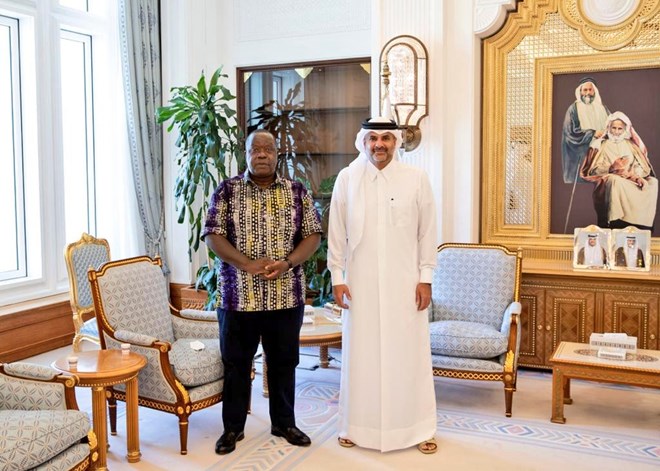
Dr. Fred Matiang’i (L) with Qatari PM Sheikh Khalid Bin Khalifa Bin Abdulaziz Al Thani. PHOTO: TWITTER
Nairobi (HOL) – Kenyan President Uhuru Kenyatta sent his Cabinet Secretary (CS)in charge of Internal Security Dr. Fred Matiang’I to Doha on Wednesday to deliver a message to the Qatari Emir Sheikh Khalid Bin Khalifa Bin Abdulaziz Al Thani.
The move comes as the International Court of Justice (ICJ) plans to render its verdict in the maritime dispute between Somalia and Kenya on October 12.advertisements
Speaking after meeting with the Qatari leader, Matiang’I tweeted that the two governments were in the process of brokering a security deal.
“It is was my humbling privilege to deliver a special message from H.E. President Kenyatta to H.E Sheikh Khalid Bin Khalifa Bin Abdulaziz Al Thani, the Prime Minister of Qatar. Our governments are on course to sign a comprehensive security agreement anchored on mutual interests.”
Qatar has been pivotal in brokering the resumption of diplomatic relations between Kenya and Somalia after Somalia cut ties in December 2020.
Qatar had dispatched its Special Envoy for Counterterrorism and Mediation in Conflict Resolution, Dr. Mutlaq al-Qahtani, to lead the mediation efforts after Somalia accused Kenya of interfering in its internal affairs cut all diplomatic relations in December 2020.
Somalia and Kenya both sent their security ministers to Qatar to meet with the Emir and PM as the maritime case was proceeding in The Hague.
This week, the ICJ notified Somalia and Kenya that it would deliver its ruling in the longstanding maritime dispute on October 12 at the Peace Palace in the Hague, Netherlands. The verdict could bring a legal conclusion to a nearly seven-year-long saga.
The court will rule on who has rights over a 100,000sq km triangle of water believed to hold valuable hydrocarbon deposits. Three blocks currently operated by Italian oil giant Eni are in the disputed area.
Kenya abruptly pulled out of the case as hearings began in Mid-March, accusing the U.N’s highest court of bias after the ICJ denied its request for additional postponement. Kenya has argued that the African Union should handle the case.
Somalia has resisted pressure from Kenya to reach an out-of-court settlement.
A final decision in the case could take years after appeals are filed.
Qatar does have an interest in brokering a deal between Somalia and Kenya. Qatar Petroleum, which the Qatari government owns, acquired a block of Kenya’s offshore oil and gas exploration fields in July 2019. Qatar Petroleum signed a consortium deal to take over three blocks within the maritime border from Total, a French oil and gas company and Eni.
The deal gave Qatar Petroleum a 25 percent stake (13 from Eni and 11 from Total) within the three blocks. Eni would retain 41.25% participating interest, and Total would receive 33.75% participating interest.
The three offshore blocks are located in the Lamu basin- they have approximately 15,000 square kilometres and the depth of water rangers between 1000 and 2800 meters.
Kenya awaits hostile ruling in Somalia border row
Kenya awaits hostile ruling in Somalia border row




Source: Nation, By Alex Ndegwa
Saturday September 25, 2021
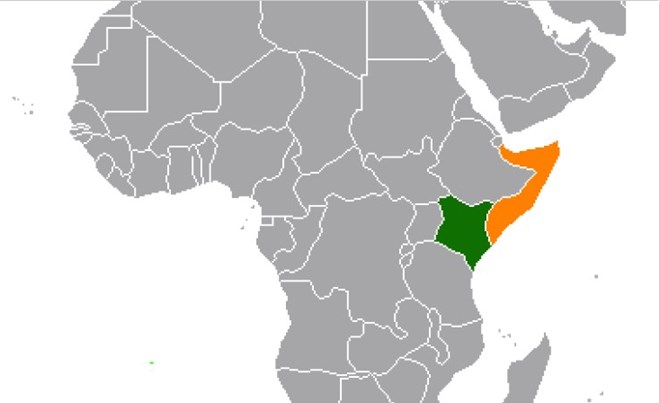
Kenya is on high alert ahead of next month’s judgment on the Indian Ocean boundary dispute with Somalia, which is expected within government circles to be adverse.
The International Court of Justice (ICJ) will announce the decision on October 12, ending a protracted case between the two neighbours that the war-torn Horn of Africa nation filed in 2014.
Its verdict is final. The timing of the judgment – it coincides with the 10th anniversary of Kenyan troops storming Somalia to fight the al-Shabaab terrorists – is also being considered a “slap in the face”.
advertisementsThe Nation has learnt Kenya will not accept a hostile ruling and a decision has been taken within the highest level of government to defy the court.
Disregarded
Some of the court’s verdicts have in the past been disregarded, including by the US, which in 2018 rejected the court’s order that sanctions against Iran should not include humanitarian aid or civil aviation safety.
And in 1986, the US had also attacked the court after it ruled America owed Nicaragua war reparations.
Kenya has also vowed not to accept what it considers “an illegitimate process” by an international entity.
“We are proceeding on the assumption that the verdict will be adverse. The manner in which the court conducted itself when dealing with Kenya, including rejecting a string of merited applications, is a key pointer,” a senior Kenyan official told Nation yesterday.
The official went on: “A lot is being done, including security-wise. It’s a matter with huge national security implications. A nation must guarantee the security and well being of its people.”
According to the official, even what would be considered a compromise by the court would involve surrender of a part of the territory, which is unacceptable to Kenya.
Treated unfairly
Kenya contends the court treated it unfairly by rejecting a string of merited applications, including one asking that judge Ahmed Yusuf, a Somali, should step down over conflict of interest.
Justice Yusuf had been at the helm of the court since 2018 and was replaced as president of the ICJ in February by judge Joan Donoghue from the United States.
Kenya has also alleged some world powers with interests in vast minerals within the contested area have been meddling with the case to ensure Somalia, which attempted to sell some oil blocks at an international auction in London, UK, takes over the area.
Nairobi boycotted the ICJ’s public hearings, leaving Somalia to argue its case in one-sided proceedings that closed in March in The Hague.
Bias
Judge Donoghue then announced that even without Kenya’s participation, the court would rely on previous documents filed by Kenya, which accuses the world court of bias.
Before Kenya notified the court of its withdrawal from the case on March 11, it had applied to be allowed to submit new evidence that has been “missing” and is “highly relevant”.
“Most particularly, the Republic of Somalia (“Somalia”), while asserting that its 1988 Maritime Law’s reference to a ‘straight line’ refers to an equidistance line, conveniently failed to produce the map included in the law,” Kenya stated in court papers filed in February.
“This Somali map, which the court should reasonably expect Somalia to produce, is critical since it has the potential of undermining Somalia’s entire claim … Whatever Somalia’s missing map depicts is categorically not an equidistant line.”
Kenya argued that any consideration of the equidistant claim would set a dangerous precedent as it would not only reward Somalia’s belligerent conduct but also had the potential of disturbing already established boundaries, triggering disputes including with neighbouring Tanzania that could escalate to South Africa.
The dispute
As adjacent coastal states facing the Indian Ocean to the east-south east, the maritime claims of Somalia and Kenya overlap, including in the area beyond 200 nautical miles.
The parties disagree about the location of the boundary in the area where their maritime entitlements overlap, according to court records.
Somalia, which filed the case in 2014, argues the maritime boundary between the parties in the territorial sea, exclusive economic zone (EEZ) and continental shelf should be determined in accordance with the United Nations Convention on the Law of the Sea (Unclos) Articles 15, 74 and 83, respectively.
Article 15 of Unclos states: “Where the coasts of two states are opposite or adjacent to each other, neither of the two states is entitled, failing agreement between them to the contrary, to extend its territorial sea beyond the median line every point of which is equidistant from the nearest points on the baselines from which the breadth of the territorial seas of each of the two states is measured.”
But there is a rider. “The above provision does not apply, however, where it is necessary by reason of historic title or other special circumstances to delimit the territorial seas of the two states in a way which is at variance therewith.”
Article 74 states: “The delimitation of the exclusive economic zone between states with opposite or adjacent coasts shall be effected by agreement on the basis of international law, as referred to in Article 38 of the Statute of the International Court of Justice, in order to achieve an equitable solution.”
The same provision applies under Article 83 with respect to the delimitation of the continental shelf.
In both instances, the Articles provide where there is an agreement in force between the states concerned, questions relating to the delimitation of both the EEZ and continental shelf shall be determined in accordance with the provisions of that agreement.
Equidistance principle
Somalia’s argument is based on the use of the equidistance principle as the method of determining states’ maritime boundaries.
Accordingly, Somalia argues, in the territorial sea, the boundary should be a median line since there are no special circumstances that would justify departure from such a line.
With regard to the EEZ and continental shelf, Somalia contends, the boundary should be established according to the three step process that the court has consistently employed in its application of Articles 74 and 83.
But Kenya’s case is that a boundary along the parallel of latitude has developed through the consent of Somalia since 1979.
Since Somalia never protested for that long, Kenya contends that a boundary was established by a tacit agreement between the two states.
Straight line
Accordingly, Kenya’s position on the maritime boundary is that it should be a straight line emanating from the states’ land boundary terminus, and extending due east along the parallel of latitude on which the land boundary terminus sits, through the full extent of the territorial sea, EEZ and continental shelf, including the continental shelf beyond 200 nautical miles.
Kenya measures the breadth of its territorial sea and EEZ from a series of straight baselines covering the full length of its coast.
These baselines were first declared in the 1972 Territorial Waters Act and have been amended from time to time.
Kenya’s submission to the Commission on the Limits of the Continental Shelf (CLCS) is that the outer limit of its continental shelf lies fully 350m from its coast.
Kenya asserts that all its activities including naval patrols, fishery, marine and scientific research as well as oil and gas exploration are within the maritime boundary established by Kenya and respected by both parties since 1979.
However, in 2014, shortly before filing its case with the ICJ, Somalia claimed a maritime boundary along an equidistance line, ignoring the 35-year recognition of the maritime boundary along a parallel of latitude.
Court decision
The court will determine, on the basis of international law, the complete course of the single maritime boundary dividing all the maritime areas appertaining to Somalia and to Kenya in the Indian Ocean, including in the continental shelf beyond 200 nautical miles.
Also, the ICJ judges will determine the precise geographical coordinates of the single maritime boundary in the Indian Ocean.
The judges are Yusuf, Peter Tomka (Slovakia), Ronny Abraham (France), Mohamed Bennouna (Morocco), Antônio Augusto (Brazil), Xue Hanqin (China), Julia Sebutinde (Uganda), Dalveer Bhandari (India), Patrick Robinson (Jamaica), James Crawford (Australia) Nawaf Salam (Lebanon), Iwasawa Yuji (Japan) and Georg Nolte (Germany).
Bomb attack ‘kills several’ in Mogadishu bombing
Bomb attack ‘kills several’ in Mogadishu bombing




Source: Hiiraan Online, Saturday September 25, 2021
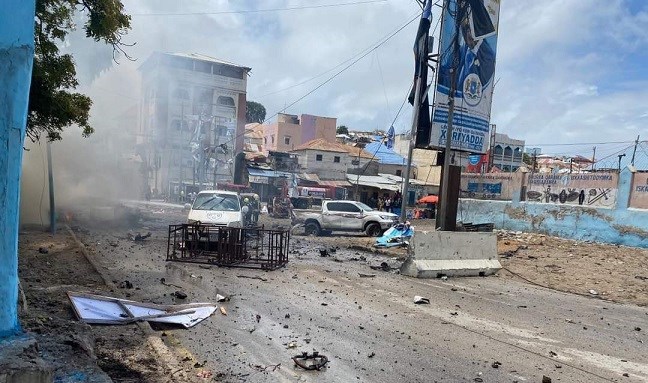
MOGADISHU (HOL) – A heavy bomb explosion rocked a checkpoint near the Presidential Palace in Mogadishu Saturday morning amid fears of deaths.
A vehicle loaded with explosives reportedly rammed into the checkpoint killing several people in the area, sources saidadvertisementsAl-Shabaab militant group has claimed the responsibility attack which happened at road linking Waberi and Hamarweyne districts near Villa Somalia.
The group said it was targeting senior government officials.
Galmudug State of Somalia says pulling out of Farmaajo-Roble mediation talks
Galmudug State of Somalia says pulling out of Farmaajo-Roble mediation talks



Source: Hiiraan Online, Saturday September 25, 2021
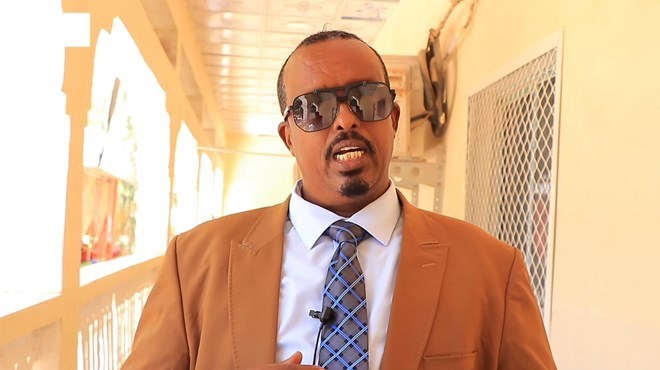
DHUSAMAREB (HOL) – Galmudug State has said it is withdrawing from mediation talks between Prime Minister Mohamed Roble and President Mohamed Farmaajo.
Information Minister Ahmed Shire Falagle said in a media interview his team had pulled out from the talks after the two leaders ‘failed to resolve their differences’.
“Since there is no agreement and a lot of time has been spent, we are going to make it clear that we will no longer be a part of any negotiating team. Therefore as Galmudug, we are standing aside to see what is going to happen as the leadership of the country fail to resolve their differences,” Falagle said.
advertisements
Galmudug State minister Omar Shido pointed fingers at Farmaajo Friday noting the outgoing President had become an obstacle to the talks.
“As you are aware, the President of Galmudug, Ahmed Abdi Kariye (Qoorqoor) has been working on resolving the dispute over the Ikraan Tahliil case, which has caused a great deal of controversy between President Farmajo and Prime Minister Roble.
The meeting ended in a stalemate, with PM Roble’s side showing maturity while facing a major challenge that ended the talks,” said Shido.
The collapse of the talks could adversely affect preparations for the next phase of elections which involves voting for the 275 members of of Lowet House.
US calls for Somalia leadership to resolve ‘dispute’
US calls for Somalia leadership to resolve ‘dispute’




Source: AFP, Tuesday September 21, 2021
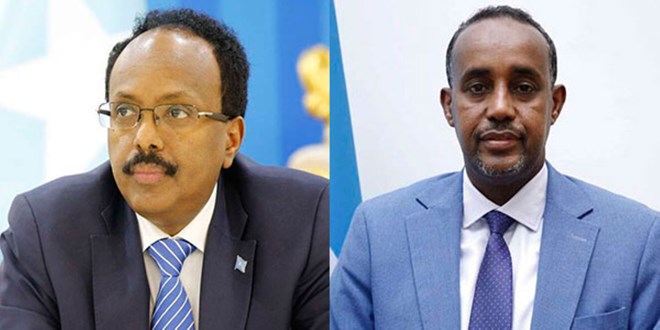
The United States called Monday on the president and prime minister of Somalia to resolve their “dispute,” so as not to further delay the country’s electoral process, with the African nation’s presidential election scheduled for October 10.
“Cooperation among Somalia’s leaders — particularly President Farmaajo and Prime Minister Roble — is essential to ensure that the country quickly completes its ongoing electoral process,” State Department spokesman Ned Price said in a statement.
“The dispute between President Farmaajo and Prime Minister Roble risks complicating this process and needs to be resolved immediately and peacefully.”
advertisementsThe rivalry between President Mohamed Abdullahi Mohamed, popularly known as Farmaajo, and Prime Minister Mohamed Hussein Roble has raised concerns for the country’s stability.
The long-brewing dispute escalated this week when Farmajo suspended Roble’s executive powers, a move the premier rejected as unlawful.
Somalia is due to vote for a president on October 10, but the leaders’ spat threatens to imperil the repeatedly delayed poll and distract from efforts to confront a long-running Islamist insurgency.
The months-long delay has “concerned” Washington, Price said, stressing that any further postponement “increases the potential for violence and plays into the hands of al-Shabaab and other extremist groups seeking to destabilize the country.”
The radical Islamist group Al-Shabaab, whose insurgency was unleashed on Somalia in 2007, control large rural areas and regularly carry out attacks in the capital.
Sudan state media report ‘failed’ coup attempt
Sudan state media report ‘failed’ coup attempt




Aljazeera, Tuesday September 21, 2021
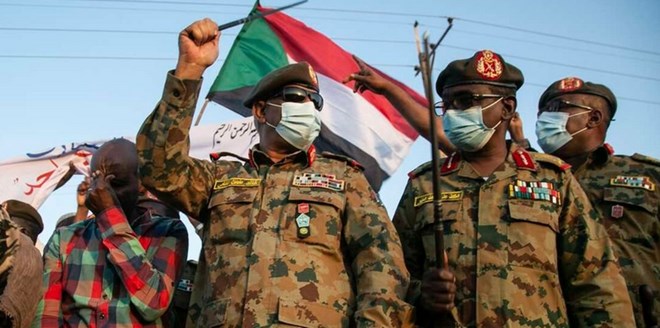
Sudanese authorities reported a coup attempt on Tuesday by a group of soldiers but said the attempt failed and that the military remains in control.
Sudan’s state-run television called on the public “to counter” the attempt but did not provide further details.
“All is under control. The revolution is victorious,” Mohamed Al Faki Suleiman, a member of the ruling military-civilian council, wrote on Facebook. He also called on the Sudanese to protect the transition.
The state run Sudan News Agency later tweeted that “an authorised source in the presidency of the council of ministers said that security and military authorities have thwarted a coup attempt at dawn today”.
“The situation is under control, and those involved in it [the coup attempt] have been arrested and investigations are underway,” added the statement.
advertisementsA military official said an unspecified number of troops from the armored corps were behind the attempt and that they tried to take over several government institutions but were stopped in their tracks.
Reporting from Khartoum, Al Jazeera’s Hiba Morgan said there “there are still a lot of questions about which group exactly is behind this and the purpose of the coup”.
Morgan said that Khartoum woke up to “what seemed like a pretty normal morning” with the exception that one of the bridges leading to Omdurman, the twin city of the capital, was being blocked.
“There were tanks on the bridge preventing civilians from crossing and there were questions from the people as to why there were tanks,” explained Morgan. “Then came the report that there was a failed coup attempt.”
She added that officials have said the coup included an attempt to take over state television, the Army headquarters, as well as the Council of Ministers and Sovereignty Council that compose the country’s transitional government.
Traffic appeared to be flowing smoothly in central Khartoum on Tuesday, including around army headquarters, where months of mass protests prompted the ouster of veteran president Omar al-Bashir in a palace coup two years ago.
Sudan has been on a fragile path to democratic rule since the military ousted the country’s longtime autocratic ruler Omar al-Bashir in April 2019, following four months of mass protests.
Sudan is currently ruled by a transitional government composed of both civilian and military representatives that was installed in the aftermath of Bashir’s overthrow and is tasked with overseeing a return to full civilian rule.
Deep political divisions and chronic economic problems inherited from the Bashir regime have overshadowed the transition.
In recent months, the government has undertaken a series of tough economic reforms to qualify for debt relief from the International Monetary Fund.
The steps, which included slashing subsidies and a managed float of the Sudanese pound, were seen by many Sudanese as too harsh.
Sporadic protests have broken out against the IMF-backed reforms and the rising cost of living.
UN encourages new negotiations in dispute over Ethiopian dam
UN encourages new negotiations in dispute over Ethiopian dam
By EDITH M. LEDERERSeptember 16, 2021
Source: UNITED NATIONS (AP) — The U.N. Security Council on Wednesday encouraged Egypt, Ethiopia and Sudan to resume negotiations on the contentious issue of water availability from the dam that the Ethiopians are building on the main tributary of the Nile River.
A brief presidential statement approved by all 15 council members said negotiations should resume at the invitation of the African Union’s chairperson “to finalize expeditiously the text of mutually acceptable and binding agreement on the filling and operation of the (dam) within a reasonable time frame.”
“The Security Council calls upon the three countries to take forward the AU-led negotiation process in a constructive and cooperative manner,” it said.
The dam on the Blue Nile is 80% complete and is expected to reach full generating capacity in 2023, making it Africa’s largest hydroelectric power plant and the world’s seventh largest, according to reports in Ethiopia’s state media. Ethiopia says the $5 billion dam is essential to make sure the vast majority of its people have electricity.ADVERTISEMENT
Egypt and Sudan have said 10 years of negotiations with Ethiopia have failed, and the Grand Ethiopian Renaissance Dam is starting a second filling of its reservoir. They say this not only violates a 2015 agreement but poses “an existential threat” to 150 million people in their downstream nations.
Egypt’s Foreign Ministry welcomed the statement as a “significant push” to the stalled negotiations and urged Ethiopia to engage “seriously” in talks to achieve a legally binding agreement on the filling and operation of the dam.
Sudanese Foreign Minister Mariam al-Mahdi also called for resumption of the talks soon to reach “an agreement acceptable for the three parties.” She commented while welcoming a visit to Khartoum by Congolese Foreign Minister Christophe Lutundula, whose nation chairs the African Union.
Ethiopia’s foreign ministry said it “welcomes” the council directing the issue to the AU-led negotiations, but then added that it regrets the council “pronounces itself over an issue of water right and development that is outside of its mandate.”
In July, Egypt and Sudan sought a legally binding Security Council resolution that would require the three countries to negotiate a legally binding agreement within six months under AU auspices “that ensures Ethiopia’s ability to generate hydropower … while preventing the inflicting of significant harm on the water security of downstream states.”
The council has not adopted such a resolution, instead approving this presidential statement.
The brief council statement encouraged observers that have been invited to attend negotiations and any other observers the three countries agree to jointly invite “to continue supporting the negotiations with a view to facilitating resolution of outstanding technical and legal issues.”
The council underscored that its statement “does not set out any principles or precedent in any other transboundary water disputes.”
President Biden’s Statement on Conflict in Ethiopia
President Biden’s Statement on Conflict in Ethiopia
Source: The White House published on 17 September 2021 a “Statement by President Joseph R. Biden, Jr. on the Executive Order Regarding the Crisis in Ethiopia.”
President Biden said we fully agree with United Nations and African Union leaders that there is no military solution to the crisis in Ethiopia. He pledged the U.S. will continue to press for a negotiated ceasefire.
The Executive Order he signed today establishes a new sanctions regime that will allow the U.S. to target those responsible for, or complicit in, prolonging the conflict in Ethiopia, obstructing humanitarian access, or preventing a ceasefire. It provides the Department of the Treasury with the necessary authority to hold accountable those in the government of Ethiopia, government of Eritrea, the Tigray People’s Liberation Front, and Amhara regional government, among others, that continue to pursue conflict over negotiations to the detriment of the Ethiopian people.
President Biden emphasized that these sanctions are not directed at the people of Ethiopia or Eritrea, but rather the individuals and entities perpetrating the violence and driving a humanitarian disaster.
Labels: Amhara militia, AU, Biden administration, cease fire, Eritrea, Eritrean Defense Forces, Ethiopia, humanitarian crisis, Tigray Region, TPLF, UN, US
New Crisis in Somalia
New Crisis in Somalia
Source: Aljazeera published on 16 September 2021 an article titled “Somalia Crisis Deepens as President Withdraws PM’s Powers.”
Somalia’s president has suspended the prime minister’s power to hire and fire officials, plunging Somalia into a new crisis.
Labels: al-Shabaab, elections, governance, Mohamed Abdullahi Farmajo, Mohamed Hussein Roble, NISA, Somalia
Somali Crisis Poses Problem for US
Somali Crisis Poses Problem for US
Source: The Council on Foreign Relations blog posted on 15 September 2021 a commentary titled “Somalia’s Ongoing Political Crisis Exposes Fundamental Problem for U.S. Policy” by Michelle Gavin.
Somalia’s fragile government is again on the brink, consumed by the president and prime minister’s tussle for the control of the National Intelligence and Security Agency (NISA).
Labels: Afghanistan, elections, governance, Mohamed Abdullahi Farmajo, Mohamed Hussein Roble, NISA, Somalia, US
Debate on Potential US Sanctions for Ethiopia
Debate on Potential US Sanctions for Ethiopia
Source: Aljazeera‘s “Inside Story” ran a half hour program on 18 September 2021 titled “Will Threat of Sanctions End the Conflict in Ethiopia’s Tigray?” with Imran Khan.
Following a lead-in by Aljazeera, the program was a discussion with Zelalem Moges. international lawyer and commentator on Ethiopian politics, William Davison, senior analyst for Ethiopia with the International Crisis Group, and myself. The focus of the discussion was the rationale for and likely impact of potential sanctions recently announced by the United States.

Labels: Abiy Ahmed, Afar Region, Amhara Region, Biden administration, cease fire, counterterrorism, Eritrea, Ethiopia, humanitrian crisis, negotiations, Oromia, sanctions, Tigray Region, TPLF, US
UN Council urges restraint, dialogue in Somalia’s leadership feud
UN Council urges restraint, dialogue in Somalia’s leadership feud



Source: UN, Sunday September 19, 2021
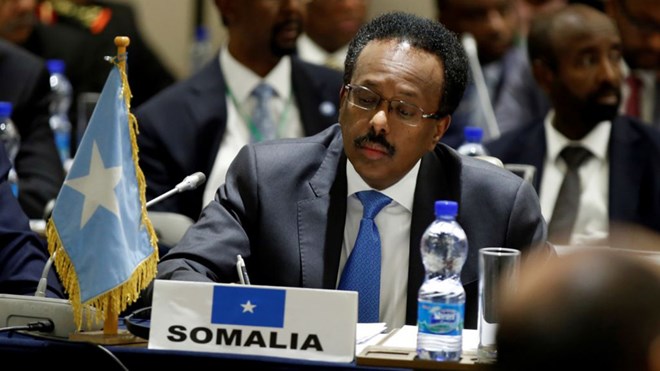
The United Nations Security Council on Saturday expressed “deep concern” over a spiralling feud between Somalia’s president and prime minister and called for both restraint and fresh talks.
The long-brewing dispute between the two leaders escalated this week when President Mohamed Abdullahi Mohamed, popularly known as Farmajo, suspended the executive powers of Prime Minister Mohamed Hussein Roble, a move the premier rejected as unlawful.
The pair have clashed over high-profile appointments this month, and their spat threatens to imperil repeatedly delayed elections in the Horn of Africa nation and distract from efforts to confront a long-running Islamist insurgency.
The UN Security Council urged “all stakeholders to exercise restraint, and underlined the importance of maintaining peace, security and stability in Somalia.”
The statement comes a day after an emergency closed-door Council meeting called at Britain’s request.
“The members of the Security Council urged all parties to resolve their differences through dialogue for the good of Somalia and to prioritise the peaceful conduct of transparent, credible and inclusive elections,” the statement said.
Somalia has been struggling to hold elections for months.
Farmajo’s four-year mandate expired in February, but it was extended by parliament in April, triggering deadly gun battles in Mogadishu, with some rivals viewing it as a flagrant power grab.
Roble cobbled together a new timetable for elections, to be held on October 10, but the process has fallen behind.
Analysts say the impasse has distracted from Somalia’s larger problems, notably the Al-Shabaab insurgency that was unleashed in 2007.
Somali Shenanigans
Somali Shenanigans
Source, The International Crisis Group (ICG) published on 14 September 2021 a statement titled “Somalia’s Politicians Play with Fire – Again.”
Tension between Somali Prime Minister Mohamed Hussein Roble and President Mohamed Abdullahi “Farmajo” have burst into the open, triggering another clash between rival branches of the federal forces. They follow the unexplained murder of a national intelligence agent and Roble’s subsequent suspension of the National Intelligence and Security Agency (NISA) chief. The murdered NISA officer was apparently poised to blow the whistle on the training of Somali troops in Eritrea, most of whom have not returned to Somalia. There is speculation they were sent to the front lines in Ethiopia’s war in Tigray Region.
Labels: al-Shabaab, elections, Eritrea, Ethiopia, military, Mohamed Abdullahi Farmajo, Mohamed Hussein Roble, NISA, Somalia, Tigray Region, training
Ethiopia: Human Rights Violations by All Sides
Ethiopia: Human Rights Violations by All Sides
Source: UN News published on 13 September 2021 an article titled “Multiple Reports of Alleged Human Rights Violations in Tigray.”
UN human rights chief, Michelle Bachelet, deplored “multiple and severe reports of alleged gross violations of human rights, humanitarian and refugee law” committed by all parties to the conflict in Tigray.
Labels: Afar Region, Amhara Region, atrocities, child soldiers, Ethiopia, Ethiopian Human Rights Commission, human rights, IDPs, OHCHR, refugees, Tigray Region, WHO
11 killed as suicide bombing hits Somalia’s Mogadishu
11 killed as suicide bombing hits Somalia’s Mogadishu




Source: Daily Sabah, Wednesday September 15, 2021
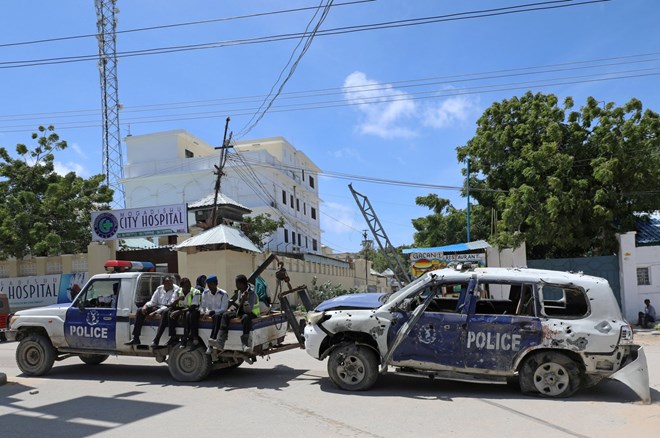
At least 11 people, including soldiers and civilians, were killed and several others wounded when a suicide bomber blew himself up at a tea shop in Mogadishu’s Wadajir neighborhood on Tuesday evening, said the police.
Dadir Hassan, a police officer in the capital Mogadishu, told Anadolu Agency (AA) over the phone that the suicide bomber targeted a busy tea shop near a major military base in Mogadishu.
“The preliminary investigations confirmed that the attack was a result of lone suicide bomber who blew himself at a teashop where security forces and civilians frequented and we can confirm that at least 11 people, including soldiers, were killed and several others wounded,” Hassan said.
Several people, most of them civilians, were also wounded in the suicide bombing and they were rushed to hospitals for treatment, he said.
The police officer added that security forces from different agencies of the government rushed to the scene and investigations are currently underway.
General Dhagabadan military training facility is located hundreds of steps away from where the suicide bomber detonated and there were a large number of security forces present in the area, according to residents who spoke to AA over the phone after the attack.
Somali-based al-Qaida affiliated terrorist group al-Shabab claimed responsibility for the suicide attack in Mogadishu on Tuesday evening, saying it had killed 11 soldiers and wounded 16 others.
Somali Prime Minister Mohamed Hussein Roble has condemned the “indiscriminate” terrorist attack.
“This barbaric act shows how al-Shabaab terrorists are thirsty for the indiscriminate bloodshed of the Somali people, forcing us to cooperate in fighting terrorism,” Roble said.
Al-Shabab has been behind hundreds of terrorist attacks over the years, including a 2017 bombing in the capital Mogadishu that took some 600 lives, the worst attack in the country’s history.
U.S. spy chief: Yemen, Somalia, Syria and Iraq pose greater terror threat than Afghanistan
U.S. spy chief: Yemen, Somalia, Syria and Iraq pose greater terror threat than Afghanistan




Source: Yahoo news, Tuesday September 14, 2021
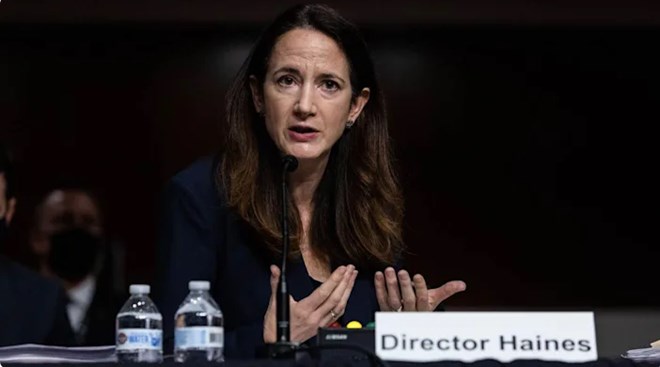
Director of National Intelligence Avril Haines said Monday that terrorist groups operating in Yemen, Somalia, Syria and Iraq currently pose a greater threat to the U.S. homeland than those in Afghanistan.
Why it matters: The Taliban’s takeover of Afghanistan has prompted new warnings from military and intelligence officials about the possibility that al-Qaeda will reconstitute.
advertisementsBut as top Biden officials have repeatedly warned, the terror threat has “metastasized” to the point that militant groups based in Afghanistan are no longer the top threat facing the U.S.
Al-Qaeda’s offshoot in Yemen, al-Shabaab in Somalia, and the Islamic State in Iraq and Syria — though it has been severely degraded in recent years — are among the terrorist groups that are currently higher on the U.S. priority list.
ISIS-K, an offshoot of the Islamic State responsible for the bombing at Kabul’s airport that killed 13 U.S. service-members and scores of Afghan civilians, is viewed as the top threat in Afghanistan.
What they’re saying: “In terms of the homeland, the threat right now from terrorist groups, we don’t prioritize at the top of the list Afghanistan,” Haines said at the annual Intelligence and National Security Summit. “What we look at is Yemen, Somalia, Syria and Iraq for ISIS. And that’s where we see the greatest threat.”
Haines stressed, however, that the U.S. “will want to monitor any possible reconstitution of terrorist organizations” in Afghanistan, and acknowledged that the Taliban’s takeover has made counterterrorism more challenging.
“Our intelligence collection is diminished and that is something that we have to prepare for and that we have been preparing for, frankly, quite some time,” she said.
World Bank upbeat on Somalia’s economic recovery, says growth to reach 2.4% this year
World Bank upbeat on Somalia’s economic recovery, says growth to reach 2.4% this year




Source: Hiiraan Online, Tuesday September 14, 2021
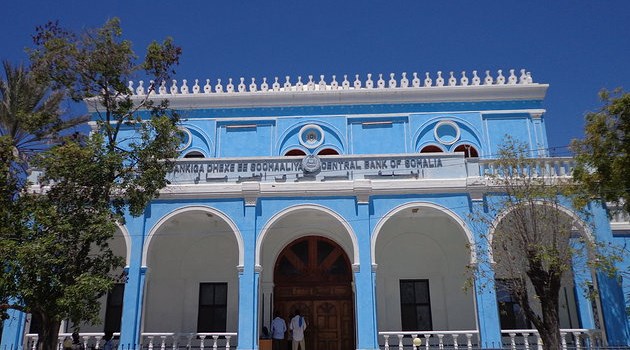
NAIROBI (HOL) – Economic growth in Somalia is set to rebound to 2.4 per cent this year following the adverse effects of COVID-19, locust infestations and extreme flooding, the World Bank has said.
The global lender said Tuesday during the launch of the 6th Somalia Economic Update that the Horn of Africa nation held out against the triple effects and only shrunk by 0.4 per cent in 2020, less severe than the 1.5 per cent contraction projected at the onset of the global pandemic.
The report notes that Somalia had higher than expected aid flows and remittances which coupled with the government’s fiscal policy measures and social protection cushioned the economy from the adverse effects of the triple shock.
advertisementsWorld Bank country manager for Somalia Kristina Svensson said this stability must be safeguarded through job creation and other forms of productivity.
As Somalia embarks on the road to recovery from the triple shocks, policy interventions that raise productivity, create jobs and expand pro-poor programs will be key,” said Svensson. “Creating jobs and ensuring that the most vulnerable are supported throughout the crisis need to be at the center of policy action and private sector response.”
The 6th Edition of the Somalia Economic Update which focuses on investments in health for growth notes that the COVID-19 pandemic has brought the sector under sharp focus and put investing in Somalia’s health system as an urgent political and economic consideration that is foundational to reducing fragility
The report also notes that strengthening Somalia’s health system is one of the biggest direct influences on improving human development and enhancing economic development in the country.
The report recommends opportunities in the areas of health financing, health service delivery and stewardship to improve Somalia’s health sector.
Incoming funding from the World Bank is aimed at helping Somalia focus on high-impact, cost-effective interventions that target the primary burdens of disease.


